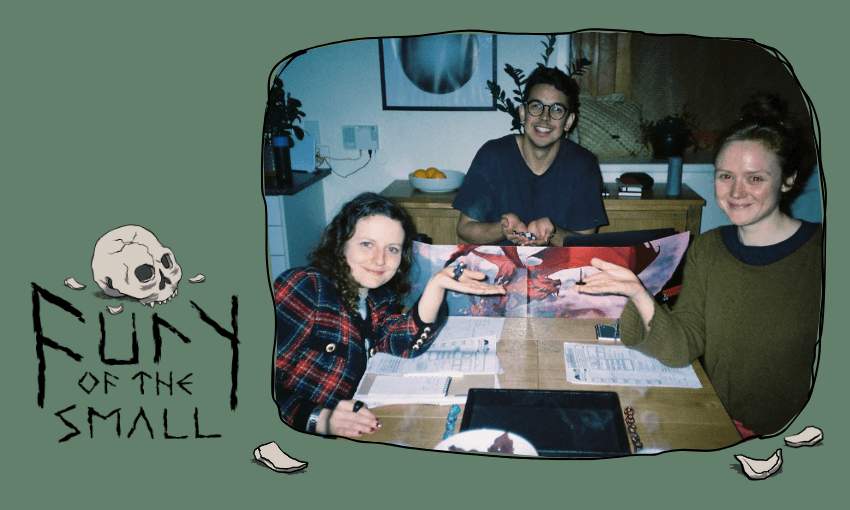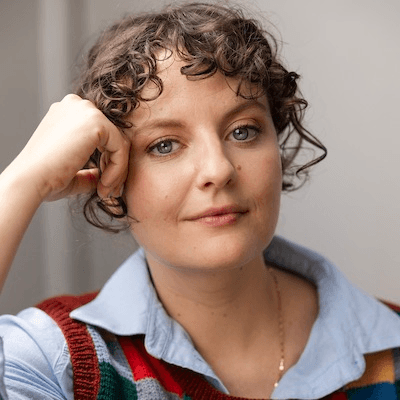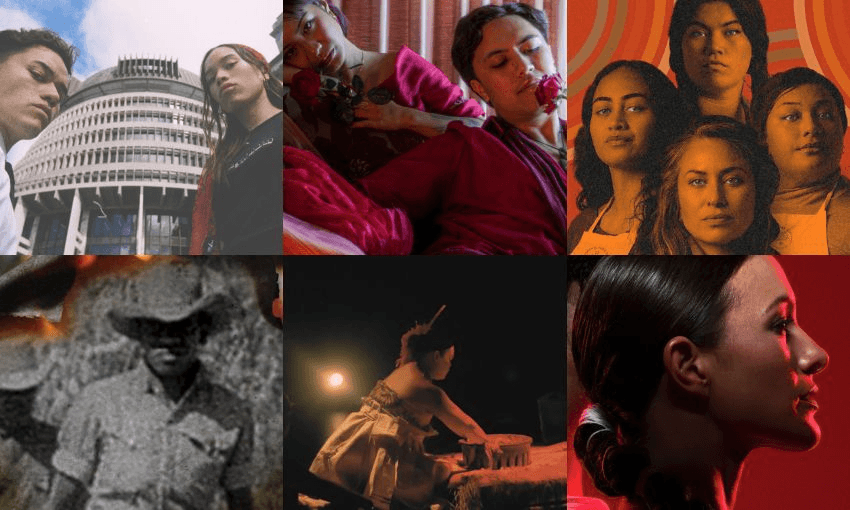This Friday, The Spinoff launches Fury of the Small, a D&D narrative podcast. Today, one of the podcast’s players remembers her first time at the table.
I was in the thick of my Big Breakup. Anyone who has been through their own Big Breakup knows exactly what I mean. It’s the one where it feels like life is leading one way and you’re merrily skipping down the path then BAM. Life, whole new direction. Crying in strange places. Hallway. On the floor. In the bathroom. I think everyone has a breakup like that? Or maybe will? It’s like a rite of passage. The one that changes you.
My friends wrapped around me in ways I still to this day deeply appreciate. One of the true blessings of the end of that romantic love was the absolutely thunderous, deepening love I felt for my friends.
There were movies (In the Mood for Love being one of them, which was a terrible choice after a breakup, but a stunning film all the same), drinking, retreats and then one friend suggested I join his… Dungeons and Dragons Campaign.
Dungeon? Dragons? Campaign? Join?
It’s hard to remember the exact images it conjured for me but I had a sense I was about to put myself in a situation where I felt stupid, sweaty or irritated. Or worse – all three.
I also had a feeling it was like some sort of real-life video game, and I am not a gamer.
Not because I don’t want to be, it just wasn’t a part of my childhood. We weren’t really even a TV household, so anything with a console felt way out of my scope. Like any good 90s kid I snuck in a few happy reps of Golden Eye and Prince of Persia at friends’ houses, but even I knew that wasn’t a well-balanced diet, so I didn’t really have anything to lean on when entering this world.
But, as is often the way after a breakup, I had a lot of energy for trying new things, a lot of spare time, and zero desire to be alone.
My first character was named Contour. Super strong. Not very smart. Got bonus points whenever they went into a rage (post-breakup catharsis anyone?). Even in this fantasy realm, no character can be good at everything (humbling) so you sort of make trade-offs. Good at hiding and sneaking around but maybe not so good up close and personal in a fight. There is something poetic about the fact that, in my eyes at least, the game works best if you have a mix of characters who all have different skill sets and histories. Not super deep, I know, but it’s still a nice thought.
I made the character by chatting to my friend about the vibe I thought I might enjoy, using films, books, animation as a way to be like “he’s a bit like this or a bit like that” and then my (very helpful) friend helped me figure out what Class that character could be. There’s lots of options: Fighter, Druid, Bard, Rogue etc. I get the sense some people do it differently, but saying “I think I want to be part actual energy of rock, part Drax from Guardians of the Galaxy and part gentle shepherd” worked well for me.
So. I’d created my character. Borrowed some dice. Then went to join the Campaign.
My friend was the dungeon master (to my mind a combo of MC, the person who voices all the background extras and supporting actors in a film, a dad who’s telling you a story, and tech support).
Six of us sat around a table, my friend set up the world, narrator style. “You’re at the docks, you smell the salty sea spray…” I started meeting other characters and for the first time I shyly tried out my Contour voice and traits. Putting on a voice felt strange at first. I’m an actor so this is ridiculous, but somehow sitting around a table putting on a voice for no reason feels different, and not in a good way. Similarly, it’s really the pits for me if I tell someone I’m an actor and they make a joke about wanting to see me do a monologue (no thank you). I don’t like feeling like I need to put on a show in my downtime, BUT after a little while, as with most times hanging out with my friends, those feelings slipped away and I was babbling like a happy child, voice on, playing for fun.
Then it was time to start rolling some dice. (We’re really in the thick of the nerd stuff now.)
Each time you want to do anything in the game – and I mean anything, the world is your oyster – you state what you want to do out loud. For example, “I want to lift this boulder”. The DM then usually says something like “well that’s a strength check”, because, well, it would take strength to do it.
In front of you is a piece of paper (or laptop screen) which has all your character’s skills written on it, things like Strength, Charisma, Performance, Deception and a number next to them representing how good you are at any one skill. In Dungeons & Dragons, most often you’re rolling a 20-sided die. You combine what your character’s natural ability is at something (maybe it’s plus 2) with what’s on the die (let’s say 14). That means overall your character has a roll of 16 to try and lift the boulder.
The Dungeon Master has a number, a fair one, in mind that you are trying to beat. Basically the higher the number the more likely you are to succeed and if you roll a 20 on the 20-sided die it’s almost impossible for you to fail. If a friend in the game says “I’m helping” – which is the equivalent of an “..and my axe!” – you might get extra pluses. Which is just lovely.
That first proper game was a lot. Even so, there were enough moments of joy across that first 5-ish hour(!) game that made me very happy to be there. True silliness and creativity for no one but ourselves.
In the game, through the form of smart storytelling it becomes clear there’s a quest/objective. A wizard needs help finding an apple pie recipe. Why is the castle collapsing? Where is the dragon hiding? You know – relatable problems like that. And all the characters must work together to sort it out.
Later that first night, my friend said something along the lines of, “This will probably take a year or so to complete”. A YEAR? I mean who has a year! In what world would I still be sitting around a table playing an imaginary fantasy game in a YEAR.
I’m sure you can see where this is going.
I played that campaign, for not one, but TWO years. I sat around my friend’s table through the seasons changing both outside (obviously) and also inside my friends’ lives, eating snacks and rolling dice through the highs and lows. As the monthly catch-ups became a staple I realised I wanted more. I joined another campaign. I had two going at once. One finished, I added another. I played confident types, sneaky types, happy-go-lucky types, “I cast a lot of magic spells” types. I’d create characters on a whim based on what I thought would be fun or a challenge and then spend the following months experimenting with this persona in the two-to-four hour games. I couldn’t believe who I’d become.
In hindsight, there were actually some big clues that I’d love it. I grew up on fantasy books. It’s only now in my 30s I’ve finally admitted to myself that when I’m on the beach I don’t want a rom com. I would much rather be reading Ursula K. Le Guin, Tamora Pierce, Diana Wynne Jones. It’s the stone labyrinth mystery cave hidden under a cloak identity life for me.
And then of course Carrie Fisher made me want to act. So yes, duh. Fantasy is for me.
And this isn’t even mentioning that my family loves all board, dice and card games (as I said, not a big TV family). So anything competitive you can play over a table is good. Even now my parents will still play at least two games of something on any given day (their current faves are Splendour and Yahtzee).
There were things that did and still do make me nervous. Being slow. Fumbling dice. Not knowing what to do. And the voices… I love listening to other people, but it still takes me a good hour to sink in and I’m usually changing the voice for the first few games till I actually find something I like for the character.
But there are other things that have taken me by surprise.
I love the escapism.
I love using my imagination.
I love not looking at my phone.
I love being in a room with dear friends for two hours laughing and not talking about work.
Hell, I even love the snacks!
Recently, it’s become a delightful connection with my brother-in-law.
As I was writing this I googled: What makes dungeons and dragons so popular. The internet replied with: What’s so great about Dungeons and Dragons? Which if you ask me sounds a lot more salty than my original question, but the answers made sense nonetheless.
D&D offers fun and educational benefits, including stress relief and mental health benefits.
Breaking D&D rules can lead to memorable gameplay and encourage critical thinking.
D&D can strengthen friendships and maintain connections, serving as more than just a game.
I couldn’t agree more.
It’s funny what you picture for yourself after a breakup. I’m not going to go into all the R-rated details of what I had in mind but suffice to say sitting around a table with sparkly dice yelling, “Investigation check!! I want to investigate this goblin’s cave!” was not it. Sure, D&D’s not for everyone. In fact, I really thought it wasn’t for me.
Turns out I was wrong.
Fury of the Small will release twice a week from May 30. Subscribe here to never miss an episode.




